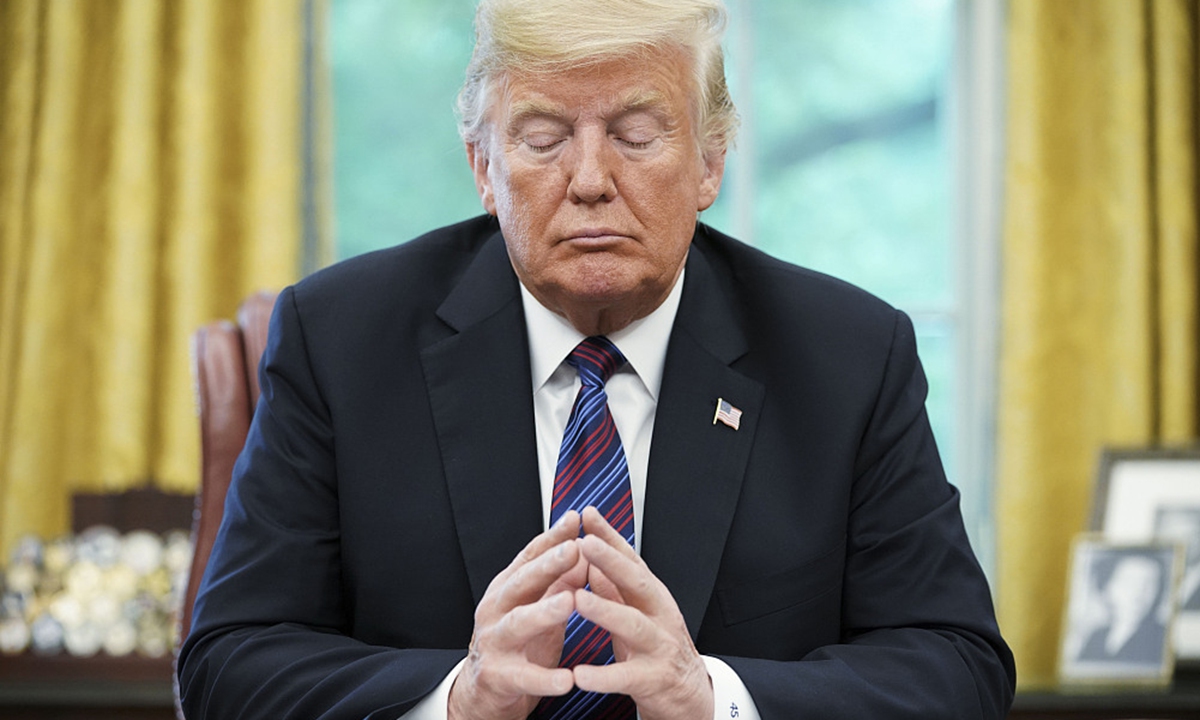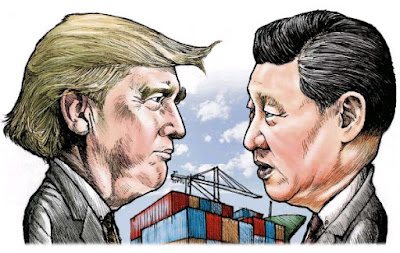Share This
Tuesday, 19 January 2021
Democracy in the US in clear and present danger

Next Wednesday, Joseph Biden will be anointed President, guarded by 20,000 National Guard troops in battle gear against not foreign enemies, but domestic threats
A week is a long time in politics. Last Wednesday, armed supporters of President Trump stormed the sanctity of the Capitol, the temple of American democracy.
This Wednesday, President Trump became the first president in American history to be impeached twice.
Next Wednesday, Joseph Biden will be anointed President, guarded by 20,000 National Guard troops in battle gear against not foreign enemies, but domestic threats.
This was supposed to happen only in Hollywood movie scripts.
 Consider these bizarre facts: the pandemic is claiming more than 4,000
deaths daily in the United States; digital media like Twitter, YouTube
and Facebook have banned tweets and comments by their own President; all
US stock market indices are still rising, and bitcoin has surged by
27.9% in 13 days.
Consider these bizarre facts: the pandemic is claiming more than 4,000
deaths daily in the United States; digital media like Twitter, YouTube
and Facebook have banned tweets and comments by their own President; all
US stock market indices are still rising, and bitcoin has surged by
27.9% in 13 days.
The article of impeachment stated in more stark terms than any foreign
commentator would dare to express: “President Trump gravely endangered
the security of the United States and its institutions of government. He
threatened the integrity of the democratic system, interfered with the
peaceful transition of power, and imperiled a coequal branch of
government.
“He thereby betrayed his trust as President, to the manifest injury of
the people of the United States.Wherefore, Donald John Trump, by such
conduct, has demonstrated that he will remain a threat to national
security, democracy, and the Constitution if allowed to remain in
office, and has acted in a manner grossly incompatible with
self-governance and the rule of law.
“Donald John Trump thus warrants impeachment and trial, removal from
office, and disqualification to hold and enjoy any office of honour,
trust, or profit under the United States.”
House Speaker Nancy Pelosi (pic below)summed it up as “he is a clear and present danger to the nation.”

Arguably, Trump has committed the sin of poisoning the well of democracy, not just in America, but for the rest of the world.
Although Western democrats extol its virtues back to the Greek Age, modern liberal democracy is very recent.
As late as 1978, only one third of the world lived in democracies; by 2015, more than half do. But since then, populism, Brexit and Trumpism have caused many to lament that democracy is receding.
Today, the gold standard of liberal democracy in America is being tested, if not questioned.
Work in progress
The problem is that liberal democracy based on social equality, rule of law, tolerance of diversity, is a work in progress.
Given very different cultures, history, religion and institutional set-ups, democracy is practiced differently, requiring huge efforts by all citizens.
Democracy that has no performance-accountability when what is promised is not delivered.
That became evident when the 2008 global financial crisis accentuated rising social inequality and insecurity to large segments of the population.
Democratic politics fragmented and did not seem to be able to deliver on promises.
Austrian economist and political philosopher Joseph Schumpeter became famous for his observation that the driver of capitalism was entrepreneurship, which led to creative destruction. He was equally original and sharp in his realist analysis of democracy.
In his classic Capitalism, Socialism and Democracy, four conditions must be satisfied for democracy to work: the quality of politicians in terms of ability and moral character; social consensus that democracy does not solve everything; a well-trained and effective bureaucracy; and finally, “effective competition for leadership requires a large measure of tolerance for difference of opinion.”
Schumpeter understood that democracy has difficulty in making decisions when society is deeply divided.
Vote-seeking
Vote-seeking behaviour means that policies are always for the short-term, so politicians under serve the long-term interests of the nation.
For example, democratic and rich countries like Australia cannot even agree on dealing with climate change, because vested interests in the mining industry consistently block change through lobbying. If democracies cannot deliver long-term structural reforms that are painful and unpopular, then in the long-run, citizens will seek alternatives, such as autocracies or anocracies (democracy with autocratic characteristics).
Trump put American democracy in clear and present danger by violating all four Schumpeter conditions.
First, nearly half the voting population ignored his moral issues, because they believed him calling the mainstream news as “fake”.
Second, he violated many of the unspoken rules, codes and conventions that buttressed democratic checks and balances, aided by lawyers and attorney generals whom he also threw under the bus.
Third, he questioned the loyalty and efficacy of the vaunted American bureaucracy, which then failed to protect the Capitol from violent protests.
Lastly, he openly sought division, rather than work bi-partisanly to heal social divisions.
Asians have much to learn from Schumpeter, who foresaw that democracy is about majority rule, but works in practice through an elite that deals in votes rather than in money. Since capitalism by definition values money more than labour, money under financial capitalism has a nasty habit of corrupting politics.
How to control money politics from corroding diverse rights and public goods is a perennial issue in all systems of governance.
If there is one lesson that should resonate in Asia, it is that violence cannot be an answer to the democratic process.
Inciting violence
Trump realised too late that inciting violence in his supporters to protect his version of electoral victory ended up with him denouncing violence in the name of law and order.
Retribution occurs to those who incite violence abroad, because violence can bounce back at home.
Next week, the Trump Reality Show will thankfully end, and life will return to some form of normality, so we can address the threats of pandemic and job losses without being diverted by another tweet.
For Trump, impeachment will only withdraw his right to hold further public office. He was made by media, and he will be haunted by media for the rest of his life. But he will go on to earn millions from book sales and paid appearances.
The clear and present danger to democracy is a distorted system where heads I win, tails you lose.
We need to change this system, but we don’t know how to do this democratically. Perhaps Joe Biden has the answer.
By Andrew Sheng, a Distinguished Fellow of Fung Global Institute, a global think tank based in Hong Kong. The views expressed here are his own.
How security threats and Covid have changed Joe Biden's inauguration ceremony
bbc.com
Trump leaves behind a bad China policy legacy
The Trump administration's China policy possesses the greatest threat to future China-US relations. It has ruined the achievements in bilateral relations the two countries had made since the establishment of diplomatic ties over four decades ago.
Trump's presidency expected to end with pardon spree as Biden era beckons
Donald Trump impeachment: A chaotic presidency doomed to end in disgrace...
Blaming China For US Poverty And The Broken American Dream
https://youtu.be/e-E8Ex1bgmQ
Related posts:
Trump-Washington disorder drags world down, lost humanity's fight for survival against climate change

Prepared for Trump’s final madness, hysteria on China policy
Trump, with surge to over 4 million coronavirus cases, is blaming Black And Brown People for Covid-19, has 100 days to save his US presidency
Trump Is ‘Blaming Black And Brown People For Covid-19 Surge
Trump Blames ‘Fauci And These Idiots’ For His Own Coronavirus Ineptitude
After laughs at Trump, globalism or patriotism?
US-China trade war escalates, tariff list aims to hinder China’s high-tech development: expert
Huawei CFO arrest violates human rights as US takes aim at Huawei, the real trade war with China
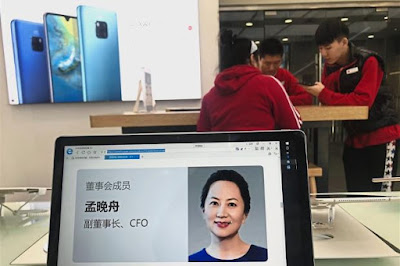
Trapped in US-China trade war when 2 elephantine economices fight ...
Who is messing with Hong Kong?
Hong Kong's youngters barking up at the wrong tree: preaching the West's cheats, divide-and-conquer, farce hearing !
US's ‘Support Hong Kong Violence Act’ condemmed
Hong Kong youth deceived by West: ‘I go to Yale, you go to jail’ mocks agitator followers
Inside America's Meddling Machine: NED, the US-Funded Org Interfering in Elections Across the Globe
Hong Kong Riots, engineered by CIA, nothing but true!
HK security laws legislation ‘justified’
EVERY NATION ON EARTH, UNLESS A FAILED STATE HAS LAWS PTOTECTING NATIONAL SECURITY
The cost and funding of the Hong Kong violence in CIA innumerable US regime-change, a price on freedom
US playing a messy game of provocations in SCS; China build up defense to thwart the provocation
US divides China by playing risky Taiwan card with arms sales that will lead to serious consequences and puts Taiwan at risk
US profited from its weapons of deaths sales to Taiwan can be curbed? Yes and undoubtedly
Friday, 15 January 2021
Malaysia's all states except Sarawak go back into partial lockdown (MCO 2.0), state of emergency declared by the King
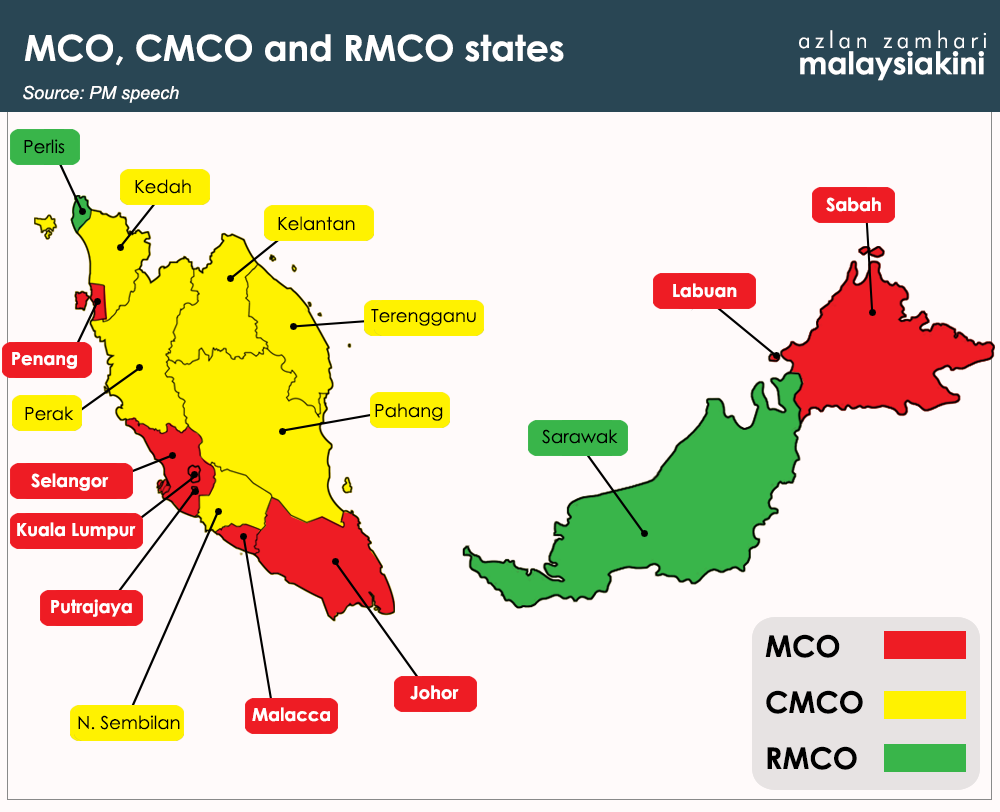
All states in Malaysia except Sarawak under MCO from Friday ...
Sarawak to be only state not under MCO | The Star
https://dai.ly/x7yryse
Malaysia's King declares state of emergency till Aug 1 to curb spread of Covid-19.
https://youtu.be/Es7N1XdvXpA
COVID-19 | Prime Minister Muhyiddin Yassin today unveiled tougher measures to control the spread of Covid-19.
This includes the implementation of full movement control order (MCO) on eight states and territories.
They are Penang, Selangor, Malacca, Johor, Sabah, Kuala Lumpur, Putrajaya and Labuan.
Another six states will be under the ongoing conditional MCO but with stricter rules than the existing ones.
Perlis and Sarawak are the only two states that will see the most relaxed rules as they will be put under the recovery MCO.
However, the Sarawak government today moved to place Kuching, Sibu and Miri under a conditional MCO.
Muhyiddin, in a live address on national TV, said the MCO will take effect at midnight of Jan 13 until Jan 26.
Interstate travel ban
For states under MCO and conditional MCO, the prime minister said social activities involving gatherings will be banned, similar to measures during the MCO in March last year.
“To reduce the risk of infection and to break the Covid-19 chain, social activities involving large gatherings such as wedding reception, conference, religious parades including Thaipusam, meetings, seminars, courses and group sports will not be allowed in any way,” he said.
However, he said states under the recovery MCO can still carry out social activities, but subject to strict standard operating procedures (SOP).
Furthermore, Muhyiddin said an interstate travel ban will be imposed nationwide.
As for states under the full MCO, they will see stricter rules as interdistrict travel is also not allowed.
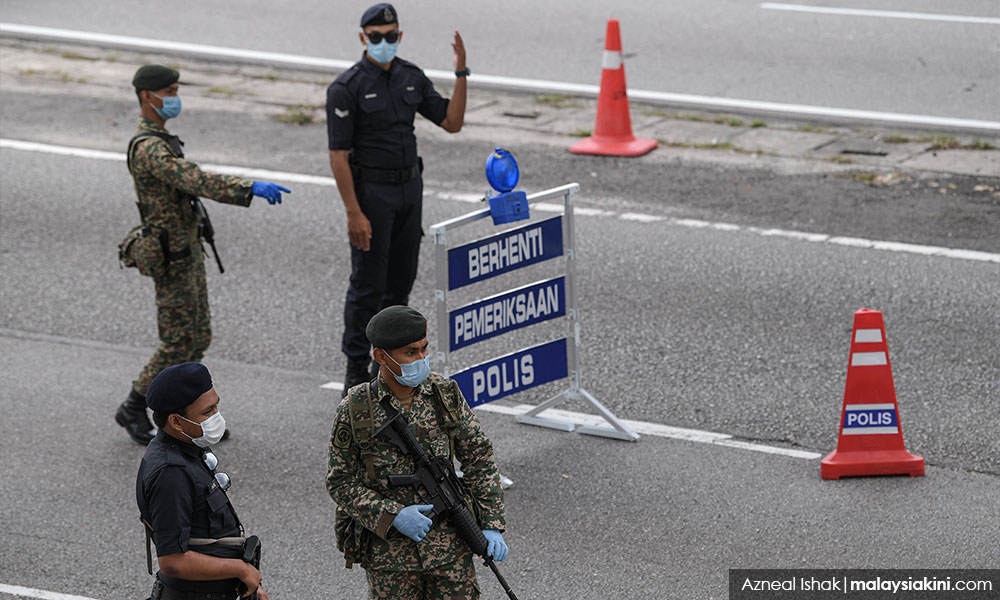
"With the interstate and interdistrict travel ban, roadblocks will be enforced from midnight of Jan 13.
"For states under MCO, the movement will only be limited to within a 10km radius," he said.
Muhyiddin added that only two persons per household are allowed to leave the house to purchase necessities from supermarkets and grocery stores.
He said the two persons per vehicle rule also applies.
Essential services
Similar to the MCO in March last year, Muhyiddin said only businesses on the essential economic sector list will be allowed to operate.
“The government has identified five sectors that will be allowed to operate and are categorised as essential economic sectors.
“They are manufacturing, production, construction, services, trade and distribution as well as plantations and commodity,” he added.
Muhyiddin said these sectors are allowed to operate as they are needed to ensure the supply chain of essential goods.
However, he said only 30 percent of their administrative staff will be allowed to operate from the office.
The prime minister also urged those who are allowed to continue working to abide by the SOPs.
He added that the International Trade and Industry Ministry will provide further details on the types of services that are considered essential economic sector.
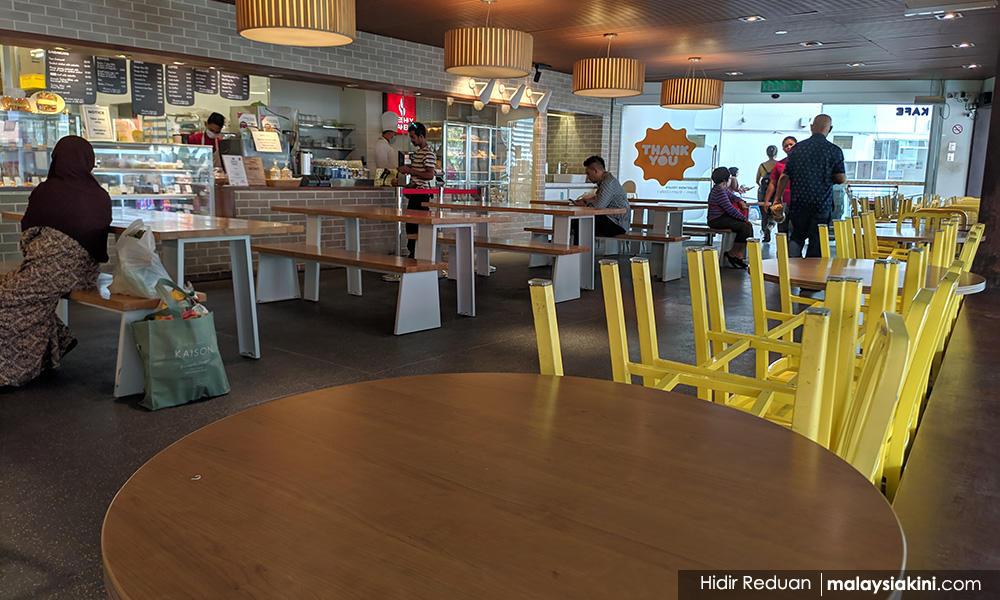
Muhyiddin said restaurants in states under full MCO are not allowed to provide dine-in services.
They will only be allowed to provide takeaway services.
However, he said restaurants in states under the conditional MCO and recovery MCO may continue to operate as per normal, subject to the Health Ministry’s SOP.
Elaborating on the full MCO states, Muhyiddin said supermarkets, clinics, hospitals, pharmacies and banks will continue to operate but with precautions.
He added that students who will be sitting for their 2020 and 2021 SPM papers will still be allowed to attend school.
As for religious activities, he said only a maximum of five people in places of worship is allowed.
However, religious activities in places of worship located in states under the conditional and recovery MCO can still proceed, in accordance with the SOP.
One distinction from the MCO in March last year is that outdoor exercising is allowed.
However, Muhyiddin said they may only do so with members of the same household.
He added that those going out for jogging or cycling should only do so with one other person at most.
Group exercise is not allowed.
MCO from Jan 13-26: Dos and don'ts -STAR
MCO, CMCO, RMCO: Dos and don'ts - New Straits Times
Top stories
Miti's list: Essential services allowed during MCO
Kindergarteners in high spirits | The Star
Related posts
The reopening of schools, childcare centres and institutes of higher learning during MCO 2.0, CMCO, RMCO
YOU HAVE THE QUESTIONS, WE HAVE THE ANSWERS
BELOW are some questions and answers relating to schools and institutions under the Education Ministry as well as the status of public examinations during the movement control order period.
School reopening
Q: Are all students in areas under the movement control order required to return to school when it reopens on Jan 20?
A: Only students sitting for Sijil Pelajaran Malaysia (SPM), Sijil Vokasional Malaysia (SVM), Sijil Kemahiran Malaysia (SKM), Sijil Tinggi Persekolahan Malaysia (STPM), Sijil Tinggi Agama Malaysia (STAM) and Diploma Vokasional Malaysia (DVM) 2020 and 2021 students, as well as the equivalent international exams, will be allowed to return to school to undergo the Implementation of Teaching and Learning (PdP) via face-to-face.
Non-examination students will undergo Home-based learning (PdPR).
Q: Will students having to undergo public examinations but living outside MCO areas be allowed to return to schools that are under MCO areas or vice-versa?
A: Yes. Special authorisation letters will be issued by the school management to allow students to cross districts or states to attend school.
Q: Are parents/guardians allowed to send their children or children under their care to school?
A: Yes.
Q: Are students in remove class who have appealed to sit for the Bahasa Melayu Literacy Screening (Pengesahan Literasi Bahasa Melayu) allowed to be in school?
A: Yes. Students can attend school to sit for the Bahasa Melayu Literacy Screening on Jan 21,2021. For students unable to attend, they can take the test on Feb 3,2021.
Central Assessment Schedule (Pengurusan Pentaksiran Pusat) and public exams
Q: Will the central assessment schedule and SPM/ SVM/ SKM/ STPM/ STAM/ DVM as well as equivalent international examinations proceed?
A: Yes.
Q: Will the postponed SPM trial 2020 be conducted?
A: Yes. The examination will proceed once school re-opens for face-to-face lessons.
Boarding School Enrolment
Q: When will students sitting for the SPM/ SVM/ SKM/ STPM/ STAM/ DVM exams be allowed to return to boarding schools?
A: Beginning Jan 16.
Q: Are parents/guardians allowed to visit students living in boarding schools that are under the MCO?
A: No.
Q: Will students be allowed to go for outings and overnight events?
A: No.
Teaching and Learning (PdP)
Q: How will PdP be implemented for students aside from those sitting for examination classes?
A: Students must undergo home-based learning (PdPR) based on the suitability and the preparedness of teachers and students. Teachers can refer to the PdPR manual which can be downloaded from the Education Ministry portal www.moe.gov.my
Q: How can Year 1 pupils for the 2021 academic session access the Digital Educational Learning Initiative Malaysia (Delima) platform as part of the PdPR?
A: Pupils can access the Delima portal using their user ID and password given by the school.
Q: How can students access the TV Pendidikan educational programme schedule? A The schedule of TV Pendidikan can be accessed via the Education Ministry’s official portal and social media platforms including Facebook, Instagram, Twitter @KemPendidikan.
Sports and co-curricular activities
Q: Will face-to-face sports and co-curricular activities be allowed?
A: No. However, virtual activities are allowed until the latest announcement from the Education Ministry.
Q: Will sports activities for PdP of the Physical Education subject and Health Education (Pendidikan Jasmani and Pendidikan Kesihatan) outside of the classroom be allowed?
A: No
Management of the textbook loan scheme (SPBT)
Q: Are the Form 5 2020 students required to return their textbooks?
A: Only after they complete their SPM examinations.
Q: Will the Form 5 2020 students be using the same textbooks used by the Form 5 2021 students?
A: No. Students will be provided with the Form 5 Secondary School Standards-based Curriculum (KSSM) textbooks for use in 2021.
Q: When will other students aside from the Form 5 2020 need to return their textbooks and collect their new textbooks?
A: Return and distribution of textbooks will be implemented based on the return schedule in stages set by the school management once school re-opens.
Q: How can students obtain digital textbooks?
A: Students can download digital textbooks from the Delima platforms at moe-dl.edu.my or teachers can help download the digital textbooks, print and distribute them based on the required topics only.
School admission assessment (PKSK)
Q: Will PKSK be implemented during the MCO period?
A: Yes. The new PKSK dates for students entering Form One are Jan 20 to 29. For Form Four students, Feb 15 to 25.
Special authorisation letters will be issued by the Education Ministry to allow candidates to cross states or districts to attend the assessment centres.
Q: What are the necessary steps that need to be taken before a candidate sits for PKSK?
A: All candidates must bring a slip to sit for the PKSK and the special authorisation letter to attend PKSK that can be downloaded below:
i. spskt1.moe.gov.my (Form 1)
ii. spskt4.moe.gov.my (Form 4)
Q: Will candidates with any medical symptoms be allowed to undergo PKSK?
A: No. Parents/ guardians will need to get confirmation from certified medical officers and inform the head of the assessment centre (Ketua Pusat Pentaksiran).
A new date for students to sit for the PKSK will be set later.
Q: Are candidates under quarantine allowed to sit for PKSK?
A: No. Students are only allowed to sit for PKSK after the end of their quarantine period. A new date for the students will be set later.
Q: Are candidates who test positive for Covid-19 and treated in hospital allowed to sit for PKSK?
A: No. However, they will be allowed to do so once they are discharged from the hospital. A new date to sit for the PKSK will be announced later.
Q: Are candidates living in MCO areas allowed to change their PKSK centre?
A: Yes. Candidates need to submit an application to the head of assessment centre (Ketua Pusat Pentaksiran) that they are applying to.
Teachers and non-education services member (anggota perkhidmatan bukan guru)
Q: When are teachers required to be at the station of duty?
A: Teachers are required to be at the station of duty before Jan 20.
Q: Are teachers required to be present at schools placed under the MCO?
A: Teachers’ attendance at schools are required as below:
i. Teachers involved in the SPM/ SVM/ SKM/ STPM/ STAM/ DVM for the year 2020 and 2021 as well as equivalent international exams.
ii. Teachers involved in examination management.
iii. Other teachers that are ordered to be present by the head of departments.
Q: Are teachers living outside of MCO areas allowed to be present at schools that are currently under MCO or vice versa?
A: Yes. Teachers are required to obtain a special authorisation letter from the head of department.
Q: Aside from teachers, who else is allowed to be present at school during the MCO?
A: i. Non-education services members (Anggota Perkhidmatan Bukan Guru) with orders from the head of department.
ii. Essential services workers such as cleaners, security personnel, and canteen staff.
iii. Wardens and boarding school administrators.
Q: Will non-education services members be allowed to work from home?
A: Yes. The head of department can consider the request to work from home made by non-education service members according to their workload and the need to be physically at the office.
Management and operations of private education institutions (IPS)
Q: Are childcare centres allowed to operate face-to-face?
A: Yes. This includes international and expatriate preschool classes.
Q: Are all categories of IPS in MCO areas allowed to have face-to-face learning?
A: No. Only classes with students that are sitting for the SPM/ SVM/ SKM/ STPM/ STAM/ DVM for 2020 and 2021 as well as equivalent international exams will be allowed to operate face-to-face.
Q: Are all IPS categories centres such as tuition/ language centres allowed to operate face-to-face learning?
A: No.
Q: Does an IPS that has been allowed to operate face-to-face learning require a special authorisation letter in order to allow students/ teacher/ staff to be present?
A: Yes.
Management and operations of Pusat Anak Genius Negara (PAGN) and Pusat Genius Kurnia (PGK)
Q: Will PAGN and PGK under the MCO areas remain in operation?
A: Yes. However, this is subject to the quota allowed; priority will be given to parents/ guardians who are both working.
Q: Can parents/ guardians send their children or children under their care for half a day to a PAGN?
A: Yes. However, parents/ guardians must inform the teachers earlier so that activities and routines for children or children under their care can be planned smoothly.
Source: Education Ministry
Related posts:
Warded at home with mild Covid-19 symptoms
PUTRAJAYA: Covid-19 patients who have mild or no symptoms will undergo treatment and quarantine at home, but they will be monitored strictly by health workers, says Health Minister Datuk Seri Dr Adham Baba.
A task force has been formed at the Crisis Preparedness and Emergency Response Centre level, state and district levels to monitor patients being treated at home, he added.
He said the home quarantine applies to Level One and Level Two Covid-19 patients, reported Bernama.
Under the Health Ministry’s system, Level One is for positive cases that do not show any symptoms, while Level Two are patients who show mild symptoms.
Level Three cases are patients with pneumonia, Level Four are those who have inflammation in the lungs and require oxygen while Level Five patients are those who come to the hospital in the late stages of the illness and require ventilator support.
“We are doing this as we need to act fast in treating and isolating positive cases and, to this end, the MOH will continue with contact tracing in efforts to flatten the Covid-19 curve, ” he said after attending the ministry’s New Year mandate ceremony here yesterday.
Dr Adham said the Level One and Two patients will be quarantined at home for 10 days and a screening test will be conducted on them on the last day.
“The screening test will be done in their respective homes and if the result is negative, they are free from Covid-19, ” he said.
Dr Adham said ministry staff will assess the size of the house and number of occupants before allowing these patients to undergo treatment at their respective homes, adding that if the house is small or crowded, the patients will be taken to hospital.
“If the facilities at home are satisfactory, with sufficient space for isolation and the family understands the need for quarantine and the standard operating procedures set by the ministry... they will be treated at home, ” he added.
He said Health director-general Tan Sri Dr Noor Hisham Abdullah will give details on the home treatment and quarantine soon.
On Jan 4, Dr Noor Hisham said MOH was considering isolating and treating Covid-19 patients who are without symptoms and or with mild symptoms at home, as the existing health facilities are not able to cope with the surge in daily cases.
Other countries have also opted to have Covid-19 patients with mild symptoms undergo isolation or quarantine at home.
In the United States, those who tested positive for the virus but who are asymptomatic are required to stay at home until it is safe for them to be around others.
People who display symptoms of Covid-19 but are able to recover at home can also undergo isolation at home, said the Centres for Disease Control and Prevention.
However, if patients manifest emergency warning signs such as trouble breathing or persistent chest pains, they are required to seek emergency medical care immediately.
In Singapore, quarantine orders are issued to those who are confirmed or suspected Covid-19 cases and Singapore’s health ministry will determine if an individual should be quarantined at home or at quarantine facilities or hospitals, based on an assessment of a person’s contact history, state of health and suitability of the home.
Travellers from selected countries may be able to serve their 14-day quarantine period at their place of residence rather than at a dedicated facility.
At immigration checkpoints, eligible travellers are issued electronic monitoring devices, which are activated immediately when they reach their quarantine accommodation.
In Australia, those who screened for the virus or who display symptoms are required to stay at home until they have tested negative or they are no longer exhibiting symptoms.
Those who are considered a suspect Covid-19 case will be advised by the public health authorities on whether they are to be isolated at home or in the hospital.
When isolating at home, patients whose symptoms get worse are to seek emergency medical attention.
While guidelines for home quarantine across different countries vary, common principles would be for patients to stay in a room separate from other household members.
Patients are encouraged to use a separate bathroom if possible and to avoid sharing personal household items with others.
Related posts:

|
|







